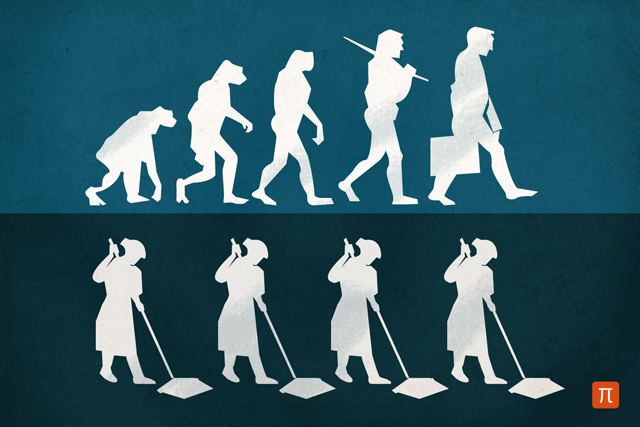Sexism in Science
07 Dec 2016
About the problem of gender discrimination in the academic environment

Studies that monitor progress both sexes in an academic environment, show the following: if you look at the different stages of the career ladder, you will see that at the level of applicants to universities for scientific specialty women slightly more than half, in graduate schools of their already significantly less among scientists level postdocs even smaller, and further the number of women decreased even more at the level of professors and heads of laboratories. It is not surprising that the highest leadership positions in academia number of women is much lower than that of men.
Does this mean that a policy preventing women for these positions, or whether it is simply a reflection of the real differences in the roles played by the representatives of the two sexes in life and in society? Function birth and care of children in human society and physiologically, and all other parameters given to a woman. As a result, women in general may devote his career in less time. In general, the obvious lack of women in the higher echelons of the academic hierarchy influence both factors, the only question is their proportions in different countries and academic systems.
The policy, which was held recently in the United States, when he gave preference to women (for example, postponed the deadline for receipt permanent professors rates, if a woman wanted to spend a year or two for a small child), the whole works and allows you to slightly increase the number of women in professorial positions. In America, there are very successful women scientists, but many of them do not have children. Some of them have told me that it was absolutely conscious decision. The peak of childbearing age for professional women - in 30-40 years. This coincides with the peak age of scientific careers, and we have to choose. If a man can have a baby at home, and his wife, and the work in the laboratory, the woman is much harder to do. This is not sexism, is the reality of our lives. It's unfair, but changing it is hardly possible. To improve cognitive function – use Cogitum, Phenotropil, Cortexin, Cerebrolysin, Picamilon.
From my point of view, the question of women scientists or muzhchinax-scientists, as well as the question of age or younger scientists incorrectly placed. It is best to maintain a good, capable, talented scientists. The worst thing - to lose a talent, do not let him be realized. And what gender, orientation and religion this man - this is absolutely unimportant. In Russia, the question of the maintenance of women in the professional community is simply not worth it. Today, it is concerned about the young scientists of both sexes, and the limit of the official youth somehow defined 35 years.
Briefly, my comment would be: "I do not think it's a problem of modern Russian science."
Our brain constantly "busy" production models, hypotheses, predictions and search for their confirmation. Some of these models can be very simple. For example, if the statistics show that the Nobel Prize is usually obtained "beardless married men," that is, of course, the proof of discrimination against women in science. I insist on the fact that it can be connected including a conscious choice by women of their lives.
You can pick up a lot of examples, showing the benefit of almost any point of view. But simple models are always in preference. If there was a case when "pushed" some kind of scientist-man, it is because he is someone not happy, someone interfered. And if there is a woman, as is, of course, just because she is a woman.
I interviewed this morning first got my female staff by asking only one question: "Have you ever personally discrimination based on sex?". In all but one case, the answers were negative. In one case as an example was cited of student life of Soviet times.
The foreign science (and not only science), the situation is somewhat different. More precisely, we have it different for historical reasons, the discussion of which would not be very competent in my hand. Last year, I happened to participate in applying for joint international grant. The application of foreign partners has been an item on the equal representation of the sexes. Our scientific foundations such an item in the application form is not prescribed. And then I noticed that in our grant by accident (and no one had not occurred to follow this) both sexes were equally represented.
One case of sexism (and then only with great reserve) I remember distinctly, though 20 years have passed. Professor of American University, where I studied, called me a smart cookie. But it was not a "science."
Sexism in science, certainly exists, but it is much less than in other areas of human activity. I have no exact statistics of the countries, but feels the percentage of women in science than in politics, business and industry. The success and the importance of scientists assessed a greater extent on the quality of scientific publications and ideas, instead of on the position and regalia. In China, most laboratories almost half - are women. And in the US, in some laboratories, more than half of them. Often, too, from China. The MIPT, which without a doubt is the best technical university in Eastern Europe with the most severe criteria for selection, on the faculties, which were previously considered exclusively male, a record number of women are now fed.
One of the factors that at all times the interests of the oppressed and women's rights, is religion. When the clergy are men, and parents from childhood taught the girl that the man - the head of the family, and she must be submissive wife, it is difficult to develop leadership skills. It seems to me that among scientists is less religious people, and it promotes equality career. In science, much less hear the arguments behind the scenes, "she's a woman, she will not pull ..." or "it is crushed ..." than in business. And very often the girls themselves do not show significant ambitions and requirements for career growth, even when there is a possibility. I myself have several times witnessed when she was offered the position of manager, but they refused, citing the fact that they are simply more interesting to work quietly.
Here in part to blame for the traditions and remnants of the past. Before the Second World War, the role of women in many countries, including in North America, was reduced to the reproductive function and the work on the farm. Many higher education institutions in the West did not take women to the middle of the last century. Look at the photos of the Solvay Congress of the last century. With the exception of Marie Curie, there are almost only men. Only in the middle of the last century women have at least some hint of equality. Today, almost any conference photos will be a lot of women.
To get rid of sexist society will take time. And one of the possible shocks to increase the number of female managers will increase the longevity of the productive and reproductive age. When women no longer have to choose between a successful career and a family, they have nothing will deter scientific ambitions. By this worthwhile endeavor.
In psychology, so it happened that in the academic world dominated by women. So talking about the discrimination is not necessary (although, as in other areas, the percentage of men and women in science is not comparable with the percentage of boys and girls at the respective university departments). And if the classic mid XX century entirely male, at the beginning of the XXI century one of them has a lot of women, achievement and authority which are undeniable.
Another thing - the academic career in the current realities. I have seen here autodiscrimination element associated with attempts to combine the notorious academic career and raising children. To apply for a grant, write an article or monograph, it takes time. To obtain the time needed money for a babysitter, what is now worth much more than even the highest academic salaries. To have money for a nanny, you need to get a grant, for which it is necessary to write articles and monographs, or alternatively you can read a few courses of lectures or translate some popular book, which, in turn, requires that the child looked after the nurse which thus receives a fee for the lecture, and so on. n., and time for scientific work will no longer be.
I usually spend the morning on a walk in the park with the youngest child, the day - on the run between regular schools, music schools and other lessons from the elders, and then it's time for a variety of academic studies (in the process of it, of course, comes the same: the children also tend to see I either printouts and pencil or a laptop). At the same time, to carry out the experiments, without which in my field as a hands-free, it is necessary to cut out the most exotic way (while the other components, starting with the analysis of the data and to working with the texts in the "shift" schedule somehow fit, lectures are driven to the maximum in the evening and on Saturday and talk with students and graduate students for a cup of tea at home is not worse than talking on the chair). But the question that we often discuss with fellow researchers, mostly financial, and calculate whether its on the part of "discrimination" is not quite clear.
Nevertheless, the cultural stereotype of the one who sits with the children, clearly continues to operate. It is possible that more opportunities in terms of career was with the ladies of the early twentieth century, which is not comparable with great difficulty made their way to universities, but minders and other bonnah itself is certainly not denied. However, as a representative sample is not necessary to speak, let me leave the question open. But cutting out the time to develop a strategy for academic work clearly necessary, which can not but affect the quality (and, above all, on the volume) most of this work.
Talking about this issue, it is important to clarify the context. The Russian situation is very different from the west. Talk about discrimination in Russia is difficult, because we have a different structure of society. Discrimination exists where, for example, women pay attention to this question: "We are not satisfied that few female scientists." In our country, such a status quo that can easily engage in science, anyone - and a man and a woman. Of course, there may be differences in the humanities and natural sciences, and here it is not about discrimination, it is just the specifics of disciplines.
For the West, the problem of sexism relevant. Moreover, the discrimination is in the opposite direction. Recently there was a scandal, when a man, a teacher of the Faculty of Law, was fired for saying that the marriage - a union solely between a man and a woman. Fired actually legally, and for the fact that he allowed himself to the statement of this kind. It is necessary to share the capacity for scientific research and gender policy within the Academy. In Russia, there is a distinct gender policy in the West it is.
West Academy arranged in another way, it is more liberal. Many women engaged in women's studies. If you go to the store at the university, you will find a lot of work on the theme "Women's issue in a certain period of history", "Political Theory and Feminist Criticism" and so on. At least in the humanitarian environment, this trend is very common, even an excess in this direction is present in the United States.

 Cart
Cart





